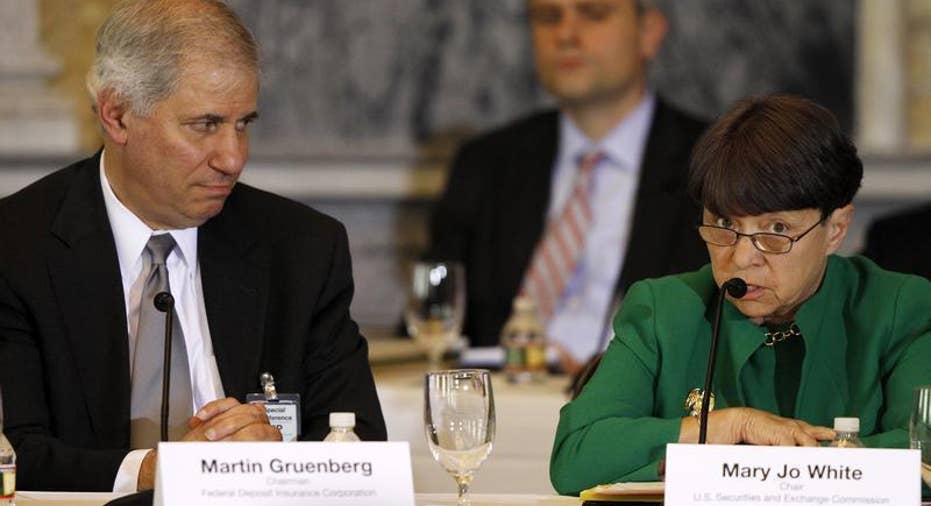White says SEC not now writing political spending rule

WASHINGTON – The head of the Securities and Exchange Commission told lawmakers on Thursday that her agency, despite pressure from liberal groups, is not currently drafting a rule that would call for public companies to disclose their political spending.
Republicans on the House Financial Services Committee pressed the issue, saying they did not want the SEC to wade into politically charged rulemaking, especially after the recent revelation that the Internal Revenue Service targeted conservative groups.
"I don't think I should comment or prejudge the benefit of the staff's review," SEC Chair Mary Jo White told lawmakers.
"No one has reached a conclusion if there should be a proposed rule going forward," she added, saying the issue is still under staff review.
White's comments were a blow to the Corporate Reform Coalition and other groups that have been leading the charge for the rule and had hoped the SEC would take up the issue quickly.
The SEC said it has received more than 600,000 comments on a petition submitted to the agency about rulemaking on political contributions; interest groups say the bulk of the comments support the measure.
Liberal groups had been hopeful that it would be on the front burner at the SEC, after political spending disclosure was included in December on a lengthy list of target areas the SEC publishes annually, known in regulatory parlance as the "regulatory flexibility agenda."
Lisa Gilbert, director of Public Citizen's Congress Watch, said in an emailed statement on Thursday she was "disappointed that the pace has not been more rapid at the SEC on the political spending rule" but that she remained hopeful that such rule would approved.
Proponents of the measure say information about political spending is critical to investors making informed investment decisions.
They also see it as a way to address the impact of the Supreme Court's 2010 Citizens United decision, which held that independent expenditures by corporations are constitutional.
That decision paved the way for a dramatic increase in spending by groups known as Super PACs, which played a major role in the 2012 presidential campaign.
But any effort to force such disclosure is staunchly opposed by some formidable opponents, such as the U.S. Chamber of Commerce, on the grounds it tramples on companies' rights and is not material to investors.
On Thursday, many Republicans on the committee sought to tie the growing scandal at the IRS with the push for political spending disclosure, saying they feared it could lead the SEC to unfairly target companies that donate more to conservative candidates and causes.
The IRS is under fire for closely scrutinizing Tea Party and other conservative groups seeking tax-exempt status, while not doing so with liberal groups. President Barack Obama late Wednesday ousted IRS Acting Commissioner Steven Miller and the Justice Department launched a criminal probe.
"This rulemaking is well-known to be a part of a partisan political agenda of labor union bosses, George Soros and assorted leftist groups who conveniently would not have to abide by the rule," said House Financial Services Committee Chairman Jeb Hensarling.
"The American people are horrified at those who would use the strong arm of government for partisan political advantage, but it remains to be seen whether this could ever happen at the SEC."
Republicans said they feared the SEC was being "bullied" by radical groups trying to take advantage of the corporate disclosure process.
Despite repeated attempts by Republicans to get White to offer an opinion on the measure, largely declined to do so.
Her fellow commissioners have been a bit more forthcoming, however.
Last year SEC Democratic Commissioner Luis Aguilar delivered a speech calling for a similar kind of rule, saying he felt investors deserve to know how the money is being used.
The two Republican SEC commissioners, however, oppose such a rule. Earlier this year, Dan Gallagher told an audience at the U.S. Chamber of Commerce that the idea was a mere political wish list.
The fifth commissioner, Democrat Elisse Walter, recently told reporters the issue was "not high" on the SEC's rulemaking agenda, and she declined to offer an opinion on the substance of the proposal.
Still, Lucian Bebchuk, a professor at Harvard Law School and one of the principal drafters of the petition, said he is optimistic that it will prevail in the end.
"Given the strength of the case for an SEC rule, and the substantial support for the rule expressed in comment on the petition filed with the SEC, I hope and expect that any staff review of the petition and subsequent submission will lead to the rulemaking in this area," he said in an emailed statement.
(Reporting by Sarah N. Lynch; Editing by Karey Van Hall, Andrew Hay and Steve Orlofsky)



















